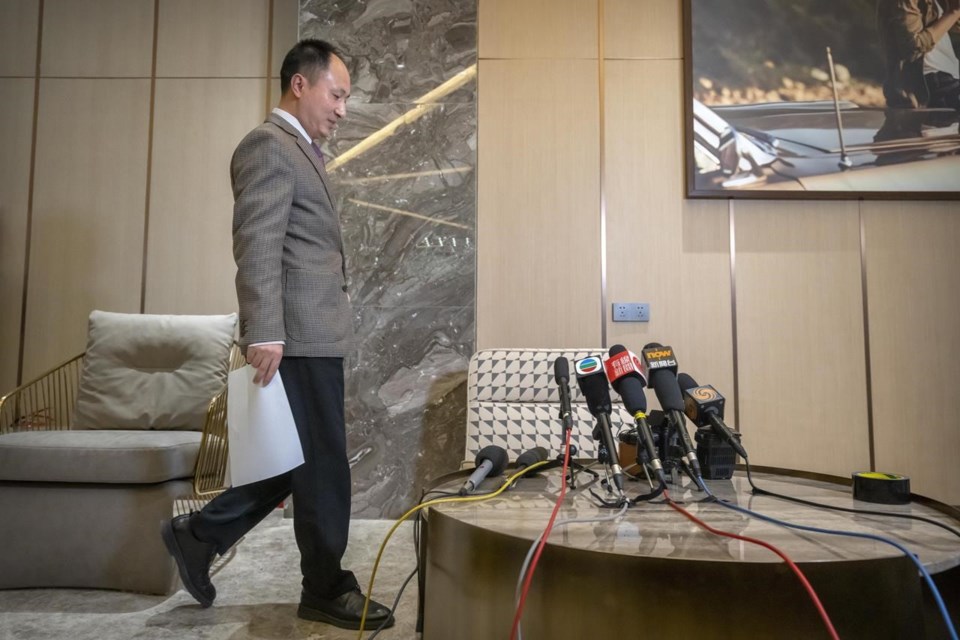BEIJING (AP) — Hong Kong on Tuesday revoked a visa it granted to a Chinese scientist who set off an ethical debate five years ago with claims that he made the world’s first genetically edited babies, pulling it hours after he announced his research plans in the financial hub.
He Jiankui shocked the world in 2018 when he announced he had altered the embryos of twin girls, with many in the scientific community criticizing his work as unethical. He was convicted by a mainland Chinese court in 2019 of practicing medicine without a license and sentenced to three years in prison with a fine of 3 million yuan ($445,000).
Ten months after his release, He announced in Beijing on Tuesday that he had been granted a Hong Kong visa and was in contact with universities, research institutes and companies in the financial hub.
He said he would consider working in Hong Kong if there were an appropriate opportunity, and that he plans to research gene therapy for rare hereditary diseases.
“My scientific research will comply with the ethics codes and international consensus on scientific research,” he said at a brief news conference.
But in a statement hours later in which it didn't refer to He by name but said it was responding to reports about a visa applicant who was jailed because of illegal medical practices, the Hong Kong government said it had revoked the visa.
“After the immigration department reviewed the application, it suspected that someone had made false statements to get the visa approval,” the statement wrote. “The director of immigration has declared that the visa is invalid in accordance with the law.”
Law enforcement officers would conduct a criminal investigation to follow up the case, it added.
He didn't immediately reply to an Associated Press request for comment.
His announcement in 2018 sparked a global debate over the ethics of gene editing. In interviews with The Associated Press, he said he had used a tool called CRISPR to try to disable a gene that allows HIV to enter cells in an attempt to give the babies the ability to resist AIDS.
The CRISPR tool has been tested elsewhere in adults to treat diseases, but many in the scientific community criticized He’s work as medically unnecessary and unethical partly because any genetic changes could be passed down to future generations.
In convicting him in 2019, the Chinese court in Shenzhen said he had not obtained qualifications as a doctor, had pursued fame and profit, deliberately violated Chinese regulations on scientific research, and crossed an ethical line in both scientific research and medicine. The court also confirmed a third birth, saying his project involved three gene-edited babies born to two women.
He was released last April and was invited to speak at the University of Oxford next month. But he wrote on Twitter this month that he was not ready to talk about his experiences over the last three years and decided to cancel the visit.
He invited about six media organizations to his news conference on Tuesday but left after reading a statement for about two minutes. He did not respond to questions as he left.
In a later written response, he said he plans to form an advisory committee on ethics to vet his future work and make sure the process is open and transparent.
He said he plans to research Duchenne muscular dystrophy, a genetic disorder that he said often causes people to die of heart and lung failure when they are about 20 years old. No medicine can cure the disease but gene therapy might help, he said.
He said his team hopes to use AI tools to improve gene therapy and lower the costs of the treatment to make it affordable to every family.
Earlier in Hong Kong, the granting of a visa to He under a new program to woo global talent raised concerns that recipients might have criminal records.
According to the Immigration Department, applicants should meet normal immigration requirements, including having a “clear criminal record” and raising “no security or criminal concerns” to Hong Kong.
Hong Kong Labour Minister Chris Sun refused to comment on individual cases but acknowledged that applicants have not needed to disclose any criminal record in the application process. He said applicants will have to do so starting Wednesday.
___
Leung reported from Hong Kong.
Kanis Leung And Emily Wang Fujiyama, The Associated Press



